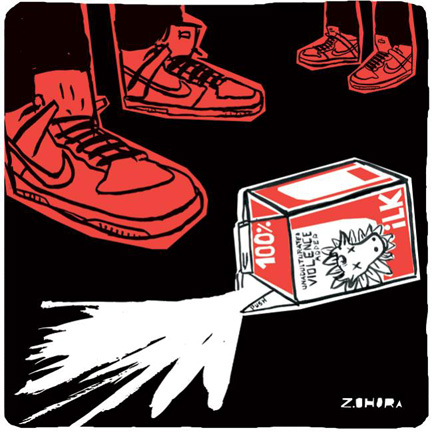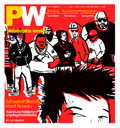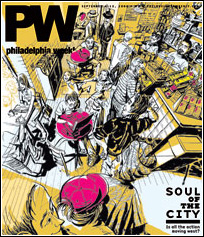Asian Students Under Assault.
Seeking refuge from school violence.
From the September 2, 2009 Philadelphia Weekly.
Wei Chen sits at the table, opens his backpack and unloads folders full of paperwork that document alleged abuses against Asian immigrant students at South Philly High.
"Sometimes it's the same student in many fights," he says, pointing to a day planner that is full of Chinese writing, listing the troubles of each particular day. "Some kids get picked on a lot."
Dozens of the alleged incidents are relatively minor - name-calling, food thrown at immigrant students, unprovoked verbal threats, petty robberies, random punches in the head while walking down stairwells, and general intimidation.
But at least six times last school year, Chen reports, those minor incidents escalated into massive rumbles where outnumbered Asian students were pummeled by packs of teens, sending several Asian students to hospitals.
Like the day last October when around 30 kids allegedly attacked five Chinese students after school in the Snyder Avenue subway station, one block from school. That incident started when another South Philly High student walked up to a Chinese student in the cafeteria, touched his hair and allegedly threw a carton of milk at him.

Rumors of threats filtered through the school on the day after the subway rumble, and the notion of continued violence froze Asian students.
"That day, all the Chinese students were very scared," says Chen, an 18-year old senior who formed the South Philadelphia High School Chinese-American Student Association in the days after the alleged subway attack. "Students avoided the lunch room. They were scared to walk home. They stayed in the ESOL (English for speakers of other languages) department until their parents picked them up."
Many Asian students continued living in fear for the remainder of the school year, even after one of the alleged subway assailants was identified on SEPTA cameras and transferred to another school. They signed petitions, wrote letters, held meetings, staged a walkout and pleaded with school administrators for help.
But the violence at South Philly High, listed among the state's "persistently dangerous schools" for the third consecutive year, continued unabated, community activists say.
***
The litany of abuses isn't limited to South Philly High.
Male and female Asian students - especially those new to the country, who speak little or fractured English - have been targeted over the past few years, in schools from the Northeast to South Philly, in elementary and high schools.
Chinese, Vietnamese, Cambodian, Pakistani and other Asian students have been singled out, assaulted in cafeterias, hallways, on city streets, school buses and everywhere in between. It's hard to know for certain why they were targeted but the victims tend to be smaller, quiet and alone.
The violence has often been dismissed by school safety officers as well as administrators, Asian students report.
"This is a cultural problem," Wei Chen claims the former principal at South Philly told Asian students on the day after the subway rumble.
District officials acknowledge that some situations weren't handled well, leaving some students feeling abandoned.
"There's a lot of mistrust," says comprehensive high school regional superintendent Michael Silverman.
The impact of the violence on such vulnerable populations can have a major impact on their lives, activists say.
"We've heard of students not going to school - as young as 8th and 9th graders," says Khin Mai Aung, a staff attorney with the Asian American Legal Defense and Education Fund (AALDEF). "Some kids drop out. Others just become less involved and perform poorly. They can't learn when they don't feel safe."
Where administrators or the School District intervened, student relations improved and the violence decreased - the number of overall violence in the district decreased by 17 percent last school year.
But the culture of violence against Asian immigrants has existed for so long at some public schools that students almost accept that random beat downs are a part of life.
***
During the weeks prior to the subway rumble, there were numerous confrontations at South Philly High, according to student incident reports.
Eight students emptied the pockets and school bag of a Chinese student in the bathroom on September 9, five days into the school year. The next day, Asian students were bombarded with oranges in the cafeteria. Several other Asian students were robbed that month, or beat up because they had no money to steal. A Chinese student was punched in the left eye while walking through a hallway on October 6. Another student was jumped in a stairwell the following day.
One Asian student reported that during the previous year, students repeatedly broke into his locker, stealing upwards of $200. During the week before the subway rumble, a Vietnamese student and his friend were jumped by 10 students, on several consecutive days, while walking home from school.
"They don't even know you," says Chen, who barely spoke English when he emigrated from the China to Philadelphia in January 2007. "They just hit because you're Asian."
By October 8, two days after the subway rumble, the Asian students were fed up. Nearly 70 students signed a petition demanding the school take action. They presented the petitions to teachers and the principal.
Then the Asian students walked out of school.
"We didn't think that day would be safe," Chen explains.
The students were marked absent. No new safety measures were added. One month later, Asian students were jumped in the ESOL classroom, their final oasis.
"If Chinese students don't go to school, it's a big problem - they don't learn," says Xu Lin, a Philadelphia Chinatown Development Corporation staffer who mentors Asian teens. "But it's a bigger problem if they go to school and get beat up."
Lin, 24, understands the situation. He and three immigrant friends were jumped by 15 kids outside Furness High School in 2001. Two of his friends were hospitalized as a result.
It was Lin's first day of school in America.

***
Chandaravuth Non, a 17-year old junior at Fels High School in Lawncrest, was waiting to catch the bus home last winter when he was surrounded by a pair of student thugs in front of school.
"I pulled my hoodie up," says Non, a native-Cambodian who arrived here in 2007. "I want to avoid trouble."
But one thug slugged him in the jaw.
"Mother fucker!" Non snapped in his thick accent, leaving each word sounding incomplete. "What the fuck?"
The attacker and his friend laughed and then sprinted away. Non never got a good look at them.
"If I go to police, they (the attackers) know," Non says. "They'll beat my face."
A few weeks later, Jeremayah Daniel, then a 14-year old freshman at Fels, was jumped by three students who bashed him on the back of his head. They continued punching him in the face, breaking his nose and causing a concussion.
"I don't even know them or why they did it," says Daniel, whose Christian family fled religious intolerance in Pakistan.
He was in the stairwell, exiting Fels at the end of the school day. Other students who walked by, never offering to help. With blood pouring down his face and splattered all over his clothes, Daniel left the building, stopped only by a safety officer who asked if he wanted to see the nurse.
No one called 911. No reports were taken by the school that day. No one from the school called afterward to learn about his condition. And no arrests were immediately made.
"He was so scared," says Daniel's mother, Khalida. "He didn't want to go back."
Daniel missed two weeks of school. Then he transferred to Washington High.
His nose is still disfigured, and the bills for the struggling family without medical insurance have mounted.
***
"Enough is enough," Eileen Coutts, Fels' former assistant principal, remembers thinking when she learned about the Daniel incident.
Coutts had been on medical leave while the violence escalated last school year. Upon her return, she scoured incident reports looking for connections.
"The pattern was that kids were being randomly targeted," she says. "A person who would be perceived as unable to defend his or herself, such as a person whose first language is a foreign language or a person who is mentally challenged, they were randomly being jumped for no reason. It wasn't to rob them or get revenge or a continuation of a neighborhood feud. It was just completely random."
There were 86 reported assaults at Fels during the 2007-2008 school year. Last year was even more violent, with 138 reported assaults, a 60 percent increase. Fels has been listed among the state's "persistently dangerous schools" for the last seven consecutive years.
Coutts found that many of the recent incidents involved two to five perpetrators, often attacking lone, immigrant students.
"We never knew who they (the perpetrators) were," Coutts says. "Nobody was able to identify anyone. We interviewed the kids who were jumped and we looked at the yearbooks. Either they were afraid to tell or they seriously did not know who was doing the jumping."
An elite squad of seven, rapid-response school police officers was assigned to Fels. Teachers began assisting with hall sweeps. Hoodies and cell phones were banned from inside the school.
Then the administrators at Fels held an open forum. They invited parents, students and several Asian, African-American and Hispanic organizations to hear the stories directly from the victims' mouths.
"The meeting was really a follow up to let people know that we're aware of this problem, we're acting on it, and we would like their help," says Coutts, who organized the March event.
A dialogue was opened, solutions proposed. And soon, the assaults subsided.
One of the initiatives from that meeting, the International Welcome Squad (IWS), will begin with the new school year that begins next Tuesday.
"Every time we get a new student who has limited English proficiency, they will be hooked up with one of the kids from the squad who speaks their language," explains Coutts. "That person will take them through the building, show them where everything is, show them where to go if they need help, and really just make them feel comfortable."
IWS student ambassadors will act as intermediaries between affected students, Fels administration and community groups, says Mia-lia Kiernan, Youth Programs Coordinator at the Cambodian Association, which has been working with Fels students.
"These kinds of partnerships with community organizations should be encouraged by the school district," Kiernan says. "The district is now not only accountable to the students and families but to a solid network of community organizations."
This year, Fels occupies a brand new building with 130 state-of-the-art security cameras. And Eileen Coutts was promoted to principal, chosen by teachers and community members to be in charge.
"They've definitely made some headway," says Khin Mai Aung of AALDEF. "But I think there is a ways to go before it impacts the students who are directly affected."
A few days after the community meeting, an Asian student walking home from Fels was pelted with rocks. She needed stitches on her face.
"Right now, I like school," says Chandaravuth Non. "But I fear going to school."
***
"I think Fels is really an interesting case study," says regional superintendent Michael Silverman. "After a fight, Eileen (Coutts) brought together all these community groups, all these people, and they worked together to build a purposeful community that cares about kids."
Transparency, honesty and creating a positive climate are the keys to success, he says. Silverman previously served as principal at Lea Elementary in West Philly, where the students spoke 47 different native languages, and at Germantown High during the year after math teacher Frank Burd had his neck broken by a student.
"My experience as a principal has taught me that I really need to build a consensus among the staff and the community," Silverman says. "We need to explain that there are values that are going to be built at the school."
Not everyone set the proper tone last year, admits Silverman, who oversees 31 schools.
"School climate was an issue in some of my schools," he says. "That was addressed in principal evaluations. Some people made it better. Some people didn't. Some people are still with us and some people are not. Bottom line is people need to take their school climate and culture very seriously. Because there is no learning in a school that doesn't have a good climate."
In addition to Fels, South Philly High begins the school year with a new principal.
Girl's High graduate LaGreta Brown was recruited out of semi-retirement to become the first African-American principal of South Philly High.
"Instead of looking at one other, pointing out each other's faults and tearing each other apart because we're different," Brown says, "we can celebrate our differences and celebrate that we're more alike than not."
A West Philly native who graduated from West Chester University and earned a master's in education from Temple, Brown has already met with Asian students and community organizations. She's aware of the school's recent history of violence.
"It's a challenge that we can address," she states.
She declines to provide specific changes she will instill, explaining that it wouldn't be right for her faculty, staff and students to learn about changes from the media rather than from her. But she says that she wants all students to have a voice in safety planning.
***
The victims and the school district are reluctant to say that the attacks are specifically black versus Asian. The district is predominantly African-American, with black students making up 62 percent of the total population. That's why they tend to be the alleged perpetrators, they say.
Asians represent 5.9 percent of the student population but they are a growing community in the city.
As of 2008, Asians accounted for 5.7 of the city's population, up from 4.4 percent in 2000 - an increase of 15,000 Asians. Many of the new arrivals move to areas populated by fellow countrymen, often in neighborhoods adjacent to longtime African-American enclaves.
"The school may be thought of as black turf by some black students," says Yale University sociologist Elijah Anderson, a renowned expert on black, urban living. "The outsiders - the Asians who are making inroads - can then be called into account for any moves they make within that situation. You have race prejudice developing as a sense of group position, a proprietary claim on certain areas of the home turf."
Anderson, who taught at Penn for 32 years and frequently uses Philadelphians in his research, believes that the school tensions are likely about dominance.
"It's a human thing," Anderson continues. "It could be Asians who get jumped. It could be blacks. It could be white, Italian, Jewish, whatever, if you know what I mean. This is not unique to blacks and Asians."
***
One Chinese immigrant student began experiencing prejudice in 2002 when he entered the third grade at Society Hill's McCall Elementary School.
"Kids get in your face and say racial stuff, throw stuff at you, push you in the halls," says the 15-year old student who spoke on the condition of anonymity. "Sometimes I can't take it and I fight back. Then I get in trouble."
He's been suspended numerous times for fighting.
"Every year, I'm at the limit," he says. "Like, one more fight and I'll get kicked out."
Despite the McCall student population being around 55 percent Asian, the abuses were steady - from white students as well as black, says the student who will begin high school next week.
"Some of my friends quit school and get jobs," he says. "Sometimes younger than me."
Another Asian McCall alum adds, "I have friends who see no future in school so they fight back, and keep changing schools."
The two students say that McCall administrators brought in peer mediators after a series of incidents. Students of different backgrounds were forced to eat meals together, watch television and converse. Following the mandatory bonding, tensions decreased.
In May 2008, Xiao Hang Pu, 17, was walking away from South Philadelphia's Furness High School with friends when another student punched one of his friends in the face. When Pu and his friends did not retaliate, they were taunted by bystanders. A mob formed and a rumble broke out. One of Pu's friends was hospitalized with a facial fracture.
"After that, school police stayed with us at the bus stop after school," Pu says.
Furness' principal was released after that year. Under a new principal, Timothy McKenna, there were no major racial incidents last school year.
South Philly High students are cautiously optimistic that a regime change there will offer similar relief.
***
During his first year at South Philly High, Wei Chen witnessed the racial tension and violence first hand but he didn't say anything. Having been raised in Communist China, he feared talking about safety officers' and administrators' disregard for the violence.
"In Chinese culture, you can't tell about problems," he explains. "If you tell about problems, you are a bad student. You're not allowed to question authority."
Plus, the racial differences were played out everywhere. One teacher called on him in class by saying, "Yo Chinese!"
Now, Chen champions the fight to end violence. He's organized community action, he's met with school administrators and he's become a leader to his fellow Asian students throughout the district.
"I never thought I could do this before," Chen says reluctantly. "I guess now I'm American."
NOTE ONE: Three months after this story was published, Wei Chen called me from South Philadelphia High School when 26 Asian students were randomly attacked. Read more here.
NOTE TWO: One month after the December riots, District superintendent Arlene Ackerman continued to ignore the plight of the Asian students. Read more here.








